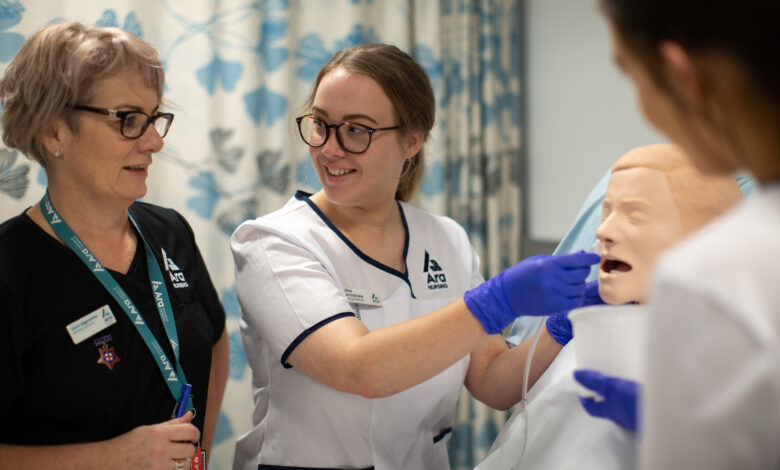
As community cases of Omicron climb in numbers, and the government readies itself for borders reopening, our health care system is trying to prepare, all while facing a national nursing shortage. Fortunately, Ara Institute of Canterbury’s department of Health Practice says people are lining up to study nursing.
The institute revealed this week the number of applicants for their health programmes, specifically nursing, have risen this year, notably so since the start of the pandemic.
“Interest levels are high for all health programmes, but in particular nursing,” says Karen Edgecombe, Health Practice – Bachelor of Nursing Academic Manager/Co-Head of Nursing.
“Whether this is due to a community response of people wanting to ‘do good’ or contribute, or because nursing is seen as a career which provides job security – either way, we’ve had unprecedented interest in both the Bachelor of Nursing and Diploma of Enrolled Nursing programmes over the last two years.”
Since the start of the pandemic, Ara has seen an increase in applications from highly qualified individuals across a range of different industries, many who are seeking to move into a career they know will continue to be in high demand.
It’s not surprising nursing is seen as an attractive career, given the latest graduate employment rates.
In the 2022 Nurse Education in the Tertiary Sector (NETS) Graduate Destinations Report, of the 376 New Zealand Registered Nursing graduates surveyed, 318 had found employment, producing a national employment rate of 84.6%.
Ara’s overall Registered Nurse graduate employment rate was reported as 93.3% – with 83 graduates now employed as nurses – the highest number when compared to other training institutes.
This result is consistent with Ara’s standing throughout the sector over the last few years. Kate Pugh, Nursing Clinical Manager – Health Practice /Co-Head of Nursing, says this demonstrates that Ara graduates are highly desired by industry.
“Over the past two years while the pandemic has been present in New Zealand, Ara nursing graduates have had to be flexible and adaptable to meet the demands of their programme along with the changes in clinical practice,” says Pugh.
As a result of COVID-19, students were able to experience new clinical placements across managed isolation and quarantine facilities, vaccination clinics and covid testing centres. Some students became provisional vaccinators with many being offered part-time employment at community vaccination centres during their studies.
“We work collaboratively with CDHB, WCDHB, and SCDHB and other health providers to provide excellent learning experiences for students, and prepare them for the workforce, even in these challenging times,” explains Pugh.
Edgecombe agrees- that the skills gained on these placements have undeniably prepared the graduates for working in an ever-changing and fast-paced environment.
“There was actually an instance last year when a student was able to teach qualified operating theatre staff how to take a PCR nasal swab test for COVID – something they learned on another placement,” says Edgecombe.
She says it’s these sorts of transferable skills which help Ara graduates to standout in the workforce.
“Ara graduates are highly sought after by new graduate programmes throughout a wide variety of health service providers across New Zealand.”
According to the Ministry of Health, there are 20,000 New Zealand qualified nurses currently not practicing. To incentivise these skilled workers to return to nursing and grow the workforce, the government has launched a new support fund, with first-round applications open now until 14 March. A second round will open in May 2022.
Through the fund, employers can apply on behalf of applicants for them to undertake training towards renewing their practicing certificate, with options such as the nine-week Competency Assessment Programme (CAP) through Ara Institute of Canterbury.
“This fund is great news for nursing,” says Edgecombe. “In times like these, with the pandemic, it really becomes clear how vital nurses are to the safe provision of healthcare. This is a career that is both resilient and flexible, with opportunities opening in New Zealand and overseas.”









